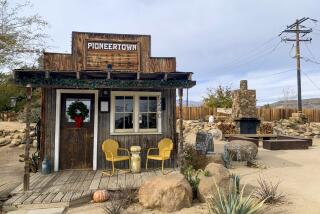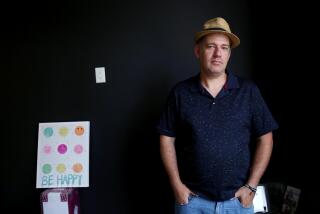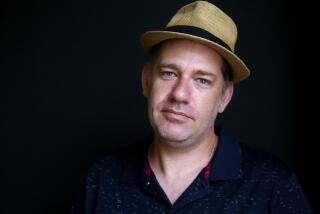Developer’s Rise and Fall Paralleled the Fortunes of Savings and Loans : Thrifts: Like some S&Ls;, Kenneth Good never met a deal he didn’t like. Now, with the industry at rock bottom, the Denver businessman is swimming in red ink.
- Share via
TAMPA, Fla. — Kenneth M. Good wore a jogging suit the night he clinched one of the biggest land deals of his high-flying career.
It was January, 1985, and Good was racing in fast times.
The savings and loan money machines were in overdrive, real estate was hot, and Florida swarmed with speculators who had cash or knew how to get it.
Good swaggered into town from Denver and pledged nearly $38 million cash for 5,400 acres of Spanish moss-draped woodlands north of Tampa. Plans for fine homes, offices and a highbrow country club were envisioned.
Five years later, the unfinished Tampa Palms development is controlled by two banks and up for sale, another victim of a faltering real estate market. Good says his net worth has plummeted from $100 million into the red.
Congressional investigators have grilled Good about links to the failed Silverado Banking, Savings & Loan Assn. of Denver and a scandal that has ensnared President Bush’s son Neil.
“I feel no shame,” the 45-year-old Good told the House Banking Committee recently. “Shame implies guilt. I think I was as much a victim of the markets as anyone else.”
The saga of Ken Good is a microcosm of the S&L; crisis: risky ventures, free-spending splendor, collapse.
Deeply indebted to Silverado and others, Good managed to convince the financially troubled owners of the Tampa site that he was their savior.
People familiar with the negotiating session said Good attended the final signing in a jogging suit, a symbolic reflection of his go-go personality. But ultimately, he came up with less than half the $38 million he promised. Site owners agreed to let him finance the rest.
He then used Tampa Palms as collateral for loans and a $70-million high-risk “junk bond” issue to finance other ventures, including the $250 million debt-financed takeover of Gulfstream Land & Development Corp, one of Florida’s major builders.
Good looked like the best thing that ever happened to Tampa until his mounting debts and the slowing real estate market toppled his empire.
“What can you say? It’s the story of the last couple years,” said James Apthorp, a former Gulfstream executive kept on as consultant at Tampa Palms after foreclosure.
Good, a Methodist minister’s son raised in a Kansas farm town, followed prosperity around the nation with what acquaintances call a barnstormer’s zeal.
In 1969, he formed Good Financial Corp. in Dallas and began amassing properties before a slump in the late 1970s. Stuck with dozens of sites and no buyers, Good dissolved the company in 1979 and moved to Denver.
It was in the shadow of the Rocky Mountains that Good honed his flamboyant personality and enlarged his network of high-profile connections.
Good helped found a home-building company, Talley Corp., which became one of Denver’s most successful developers. He resigned as chairman and sold his share for an undisclosed amount in January, 1986, just before the end of Denver’s oil boom. Talley liquidated later that year.
Meanwhile, Good had become a star in Denver’s social scene. He tossed money to charities and sipped champagne with the city’s elite. A lavish party marked the opening of his $10-million mansion, decorated with contemporary art and expensive furniture--later used as collateral for real estate deals.
Good’s circle of influential friends included Neil Bush, a Silverado director. Years later, the links between the two were still strong.
Documents filed with the House Banking Committee show Good’s Silverado debt was reduced by $8 million shortly after Gulfstream agreed to invest more than $3 million in JNB Exploration Co., an oil and gas partnership managed by Bush.
The transaction also reduced Bush’s personal liability in a line of credit for JNB. Bush, who appeared before the House panel in May, denied any improprieties in the deal.
Silverado, seized by federal regulators in December, 1988, has been the target of some Democrats who question whether the Administration moved too slowly against the thrift and are too lenient with Neil Bush. Thrift regulators have denied the allegations, but decline to specifically discuss the case.
Silverado lost an estimated $31 million on Good’s speculative investments in Colorado. Cost of the Silverado bailout is estimated at $1 billion.
“He has an uncanny sense of timing for business,” Bush said of Good two years ago. Bush did not return telephone calls for comment on this article.
Good swept into Tampa in late 1984 unknown, but quickly crafted a reputation as a free-wheeling visionary. He billed Tampa Palms--strategically located near an interstate highway--as one of the “best pieces of dirt” east of the Mississippi and a future national showplace.
His image was further enhanced by the quick acquisition of Gulfstream, based in Plantation, Fla., upping his portfolio to more than 30,000 acres.
He poured money into Tampa Palms, adding a fancy clubhouse and exquisite landscaping. He staged grand news conferences each step of the way and cultivated the local press with personally guided tours of the property.
He was toasted by politicians, courted by the chamber of commerce and revered as a deity by fellow developers. A builder at a trade meeting, where Good was a guest speaker, introduced him simply as “Mr. God.”
He wore silk suits and drove a maroon Maserati. Weekends might find him flying to Monte Carlo or New York aboard his six-seat private jet. On election night in 1988, Good flew to Houston for President Bush’s victory party.
Good’s own party in Tampa soured with the economy. Tampa Palms sales slowed, business relocations fell through, lenders pressed for payments. It was Dallas and Denver all over again. Ironically, billboards for Tampa Palms proclaim, “It Only Happens Once.”
Good himself dismissed talk of his demise. In one of his last public speeches, in May, 1989, Good labeled the rumors “cocktail conversation” and unveiled plans for other projects.
In March, a group of lenders and junk-bond holders agreed to swap more than $200 million in debt for control of Tampa Palms, other properties and Gulfstream. Good was ousted from the company.
During negotiations, the lenders forced Good to stay away.
“They would not even let him in the room,” said Apthorp. “They had so lost confidence in him.”
Meanwhile, Good faced bank foreclosure on his posh Tampa Palms home, averted only by a last-minute payment. His Denver home fetched $3.3 million at an auction last October.
Good has pulled up stakes again, this time to New York. He’s expressed interest in becoming a commodities broker.
Reached in New York by telephone, Good said he now never comments to the press. Good’s attorney, Gil Thurm, said he has no comment on his client.
“I really don’t know what his plans are,” said Charles Knight, a Tampa real estate appraiser and friend of Good’s. “But a man that’s been able to do what’s he’s done--you’re not going to keep him down.”
More to Read
Inside the business of entertainment
The Wide Shot brings you news, analysis and insights on everything from streaming wars to production — and what it all means for the future.
You may occasionally receive promotional content from the Los Angeles Times.










